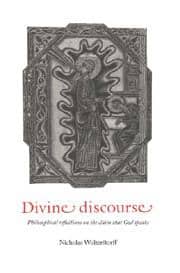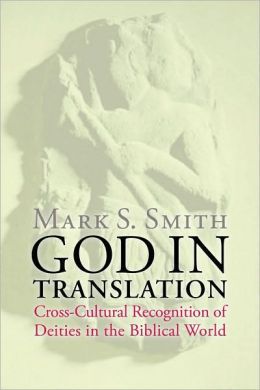Today’s post is the second of two by Carlos Bovell (see first post and bio here) on how Israel’s understanding of God developed over time and what this says about God and how God speaks.
In yesterday’s post, I made reference to Mark Smith’s book God in Translation: Deities in Cross-Cultural Discourse in the Biblical World to help describe briefly what might be called the “mainstream view” regarding the development of monotheism in Israel.
The mainstream view holds that key parts of the Bible were composed, edited and revised by post-exilic priest-scribes in order to promulgate monotheism and especially the belief that this single deity had a unique relationship with the Israelites.
It is important to note that non-evangelical scholars are not the only ones who describe portions of the Hebrew Bible in these terms. In God’s Word in Human Words: An Evangelical Appropriation of Critical Biblical Scholarship
Bible in these terms. In God’s Word in Human Words: An Evangelical Appropriation of Critical Biblical Scholarship, evangelical OT scholar Kent Sparks presents the Hebrew Bible as containing political and religious propaganda.
The propaganda, Sparks explains, was an important component of priestly-scribal activity during post-exilic times. Reminiscent of Smith, Sparks explains, “Interestingly, some of the biblical texts that purport to be very old turn out to be among these late priestly texts” (127).
What I want to do now is ponder how a believer might grapple with these issues, particularly how they might integrate scholarship with faith, in this case one’s doctrine of scripture.
In his book, Divine Discourse: Philosophical Reflections on the Claim that God Speaks, Nicholas Wolterstorff ponders how one might tease out divine speaking in the midst of human discourse. Such efforts would involve two hermeneutics, a first that attends to the human discourse and a second that focuses on the divine. While exploring the second hermeneutic, Wolterstorff helpfully introduces the notion of “transitive discourse” to
 describe the connection between the two.
describe the connection between the two.
In speech-act theory, an illocutionary act refers to what is being accomplished through speaking (e.g., asserting, promising, warning, etc.). For our purposes, we are interested in cases where what is accomplished by someone’s speech act also accomplishes something else either for that same speaker or on behalf of someone else.
So, in order to help us assimilate Mark Smith’s research, we could posit that the biblical writer (a post-exilic priest-scribe in our case) begins to frame the Hebrew scriptures in monotheistic terms by penning, say, a creation story and weaving it into the fabric of the beginning of Genesis. This constitutes a first illocutionary act (telling a creation story that features a monotheistic God and presents him as creator God of the universe).
This first speech act generates a second one: the promulgating of monotheism and especially the special relationship that exists between the Israelites and the single deity. This is all happening on the level of human discourse.
On the level of divine discourse, however, God is appropriating the two human illocutionary acts to accomplish his own purposes. In other words, God’s illocutionary act—what he accomplishes—is also generated via human discourse; however, what he sets out to accomplish is never determined by it.
This means that even if the post-exilic priest-scribes, to continue with our example, believed they were giving an historical account regarding the origins of monotheism and specifically the special relationship that exists between the Israelites and Yahweh, it does not necessarily follow that God wished to give an historical account. Again, God’s illocutionary act might be generated by the biblical writers’ illocutions, but the human illocution can still turn out to be quite different from that of God’s.
I found this approach to biblical discourse to prove quite useful for coming to terms with the research produced by biblical scholars such as Mark Smith.
I admit that I am still left with the question of how to discern what God is “saying” in scripture. But here I am encouraged by Wolterstorff ’s insistence that what God says in scripture very much depends on what kinds of things we think God is likely to say. This means that “[t]o interpret God’s discourse more reliably, we must come to know God better” (239).
For me, at least—and this is one of the important points I try to make in Rehabilitating Inerrancy in a Culture of Fear it is vital to remember that our relationship with God does not depend on our understanding of the Bible or how good we are at biblical hermeneutics. It depends on God, God coming down to humans and communing with us. Learning about just how human the Bible is should not lead one to despair, but rather to appreciate just how incarnational our God is.

